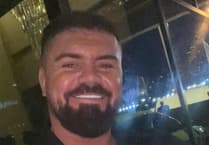The month of June is marked the world over as Pride month, a period dedicated to the celebration and commemoration of lesbian, gay, bisexual, transgender and queer (LGBTQ+) pride. This time, Siobhán Fletcher looks at what went wrong with the charity Isle of Pride, in the fourth of a five-part series.
Last time, we heard from some of the people who organised the first public Pride held here on the Isle of Man, which took place back in 2021.
This time, we are going to look back at last year’s event and hear a little about why you won’t see another one – at least on the same scale, in the Villa Marina gardens – this year.
Last June, pardons for people convicted of homosexual offences took effect, 30 years after consensual homosexual acts were decriminalised here.
A clause within the Sexual Offences and Obscene Publications Act was ‘switched on’, paving the way for individuals to automatically receive pardons.
A ‘disregard process’ was also established, to allow people to apply to have previous convictions wiped from their criminal record.
In August, then chief constable Gary Roberts became the first police chief in the British Isles to apologise for the ways in which laws criminalising homosexuality were sometimes enforced.
It followed repeated calls from campaigners such as Alan Shea for him to do so.
Mr Roberts wrote a five-page letter to the Isle of Pride charity, which highlighted the ‘institutionalised approach’ of the police force at the time.
He described the document as being, in many ways, the ‘most difficult letter’ he’s had to write in ‘a lifetime of public service’.
He wrote: ‘It is clear to me that I should do what is necessary to try to help draw a line under the past, so that older members of the gay community and their families and friends can begin to see the constabulary for what it is now, not from what some of them personally experienced many years ago, but from what it does now every day of the year.
‘It is a matter of deep and lasting regret to me that people in our community, some of whom were criminalised because of their sexuality, feel that the way the police treated them was so profoundly wrong as to make them feel fear, distrust or even hate the constabulary.’
He added: ‘Whilst I cannot apologise for the act of enforcing the law I can, and will, apologise for the way that the law was sometimes enforced.’
The apology was welcomed by the community here, including Alan Shea, who fought so hard to make it happen. He said: ‘I’ve been pushing for this since after the [Tynwald Day] campaign. One because my home was watched by the police, and two, people lost parents…
‘This apology is for everybody.’
He added: ‘I was happy it was given. Gary Roberts has done a good thing. He’s the first chief constable in the British Isles to issue an apology. So the Isle of Man has jumped forward. Now in the UK they are trying to follow suit.’
In recent weeks, Mr Shea spoke at the launch of the #ApologiseNow campaign via video link into an event held in the House of Lords.
The campaign is being spearheaded by the Peter Tatchell Foundation, in memory of TV star Paul O’Grady, who passed away earlier this year.
The Isle of Man Constabulary was certainly the big topic at Pride last year. After the apology from Gary Roberts was published, police officers were invited along to take part in the festival.
They had been prevented from participating the year before, something that Mr Roberts argued affected mainly younger LGBTQ+ members of the force, most of whom had not been born when relationships were strained.
This decision was met with a mixed reaction.
Two Manx drag performers brought a protest to the event, stating that uniformed police officers should not be allowed to attend Pride, because it completely disregards queer history and activism.
They held up signs reading “No Cops at Pride” and “No Pride in Policing”.
Fenella Beach, also known as former Manx Bard Owen Atkinson, was one of them.
At the time, they said: ‘We have a right, and indeed an obligation, to protest ーespecially about an issue that affects our community so deeply.
‘We want to clarify that our signs had nothing to do with the statement made recently by the Isle of Man Constabulary; rather, what we wrote was in reference to the history and the meaning of Pride.
‘It must never be forgotten that the first Pride was a riot against police violence. Queer and specifically trans people were the subject of harassment, discrimination, violence, rape and murder at the hands of the police. Without queer people fighting back against this, we wouldn’t have Pride in the first place. Pride is not a party: it has always been and will continue to be a protest.’
They added: ‘Police do not belong at Pride on the Isle of Man. Police do not belong at Pride anywhere. This shouldn’t be a controversial statement.
‘Many queer and especially trans people do not feel safe around police officers. This is not just historical: it is firmly and frighteningly current.’
Alongside the protest against the police, some members of the wider LGBTQ+ community questioned those involved in Isle of Pride at the highest level.
A common criticism was that the board of directors was predominantly straight, cisgender women.
Following some of the criticism from the wider Manx LGBTQ+ community, the directors of Isle of Pride unanimously decided to discontinue the charity.
In a statement, they said they believed ‘the time was right for new ideas to be explored and steered by the LGBTQIA+ community’.
The decision by the two drag artists has been criticised by some as a contributing factor, including fellow drag queen and Isle of Pride committee member Vida La Fierce, also known as Gareth Leece.
Speaking to me as Vida, she said never say never to another Pride committee forming to create a similar event.
She said: ‘I would love to see it happen. I think it will happen again, but I’d like to see it without any bitterness or rivalries or in-fighting.
‘I think it was inexcusable that the committee and the directorship were attacked for doing something so nice and so kind, that they didn’t have to do, because I know how much work they put into it.’
She added: ‘There was a comment about the fact that some of the directors were straight and cis, and some “hadn’t declared” – and I was like “Whoa – no one owes you a declaration of their identity”.
‘I really would’ve thought someone within the community would’ve understood that a bit better.’
On a separate note, in 2022, the second public Pride event platformed an issue still facing the Manx gay community.
In a pre-recorded video message, local actor and star of Netflix smash-hit ‘Heartstopper’, Joe Locke, called on the government to change a law stopping gay men on the Isle of Man from donating blood.
He said: ‘In 2014, a consultation into changing the rules was launched, with the outcome being that the policy was under review. This was six years ago and nothing has changed.
‘I call upon the Manx government and politicians within Tynwald to change this archaic law and bring the Island one step closer on its journey to acceptance.’
As a result of this public callout, a rule change was announced on May 18, 2023.
From June 1, all donors became subject to the same screening process, regardless of their sexuality or gender.
This was a change long in the making, as Agriculture Minister and Isle of Pride member Clare Barber said: ‘It would be fair to say that there was a lot of work done previously – certainly Alex Allinson for example as a backbencher put questions in on that topic – but I think having someone of that high a profile at an event of that size call something out, unquestionably focuses the mind.
‘There was work going on behind the scenes, and I’m not suggesting that just because someone says something that we can suddenly do things lots quicker, but it certainly perhaps changes priorities a little bit because it shows the level of feeling there is behind something and that was clear.’
This is an extract from the fourth instalment of several articles looking at the history of Pride.
To hear more, tune into the next episode of ‘A Brief History of…’ on Manx Radio tonight (Tuesday, June 27) at 6pm.
Next week, we’ll be looking at why we still need Pride, both here and around the world.




